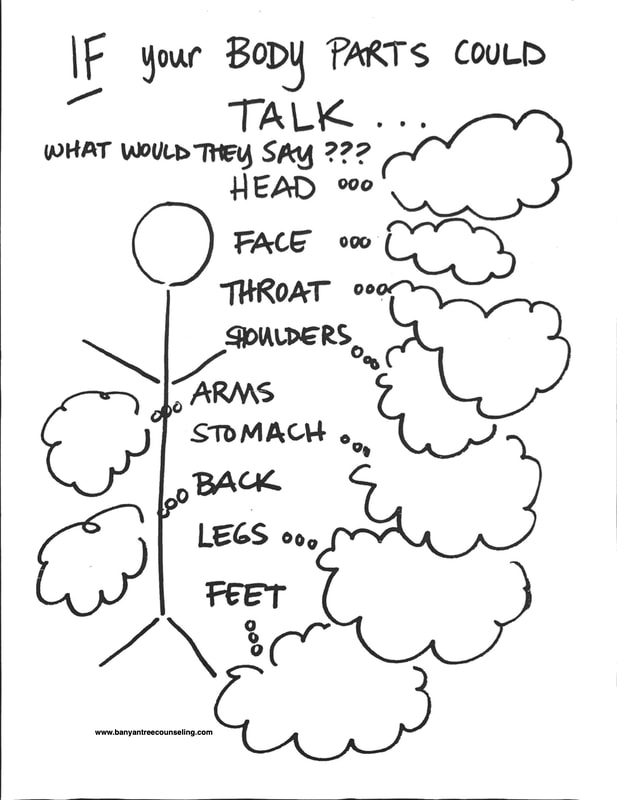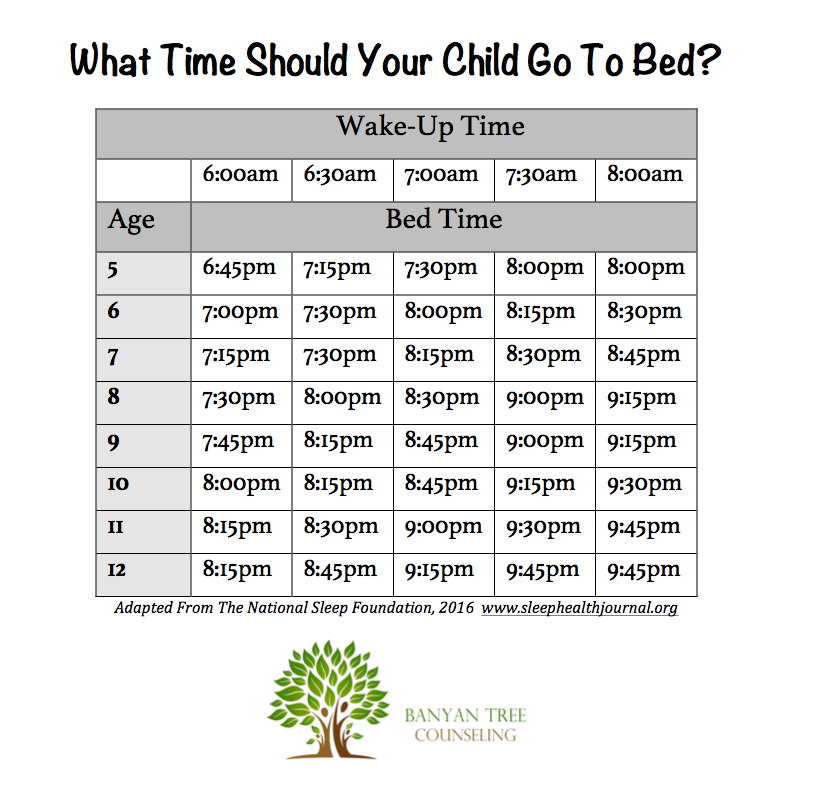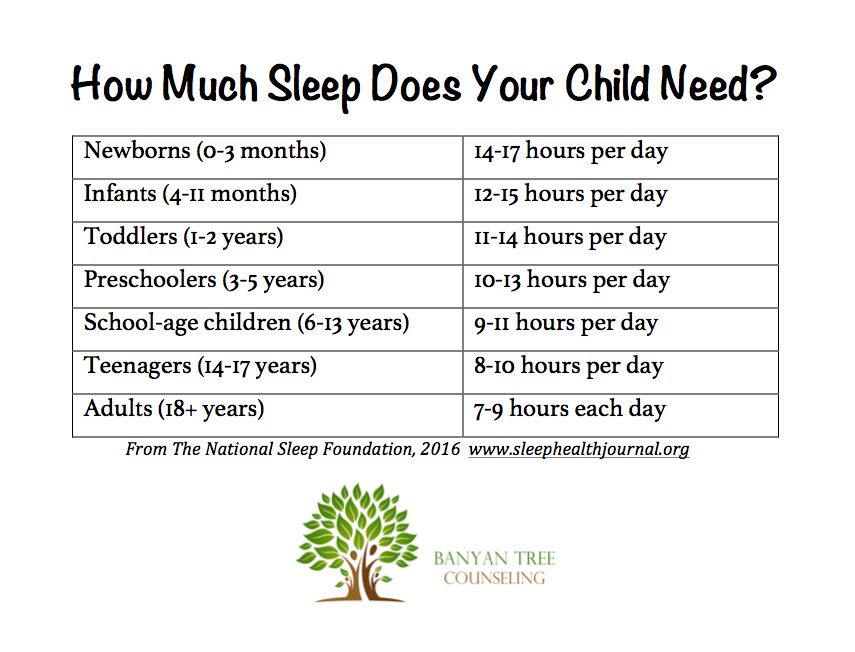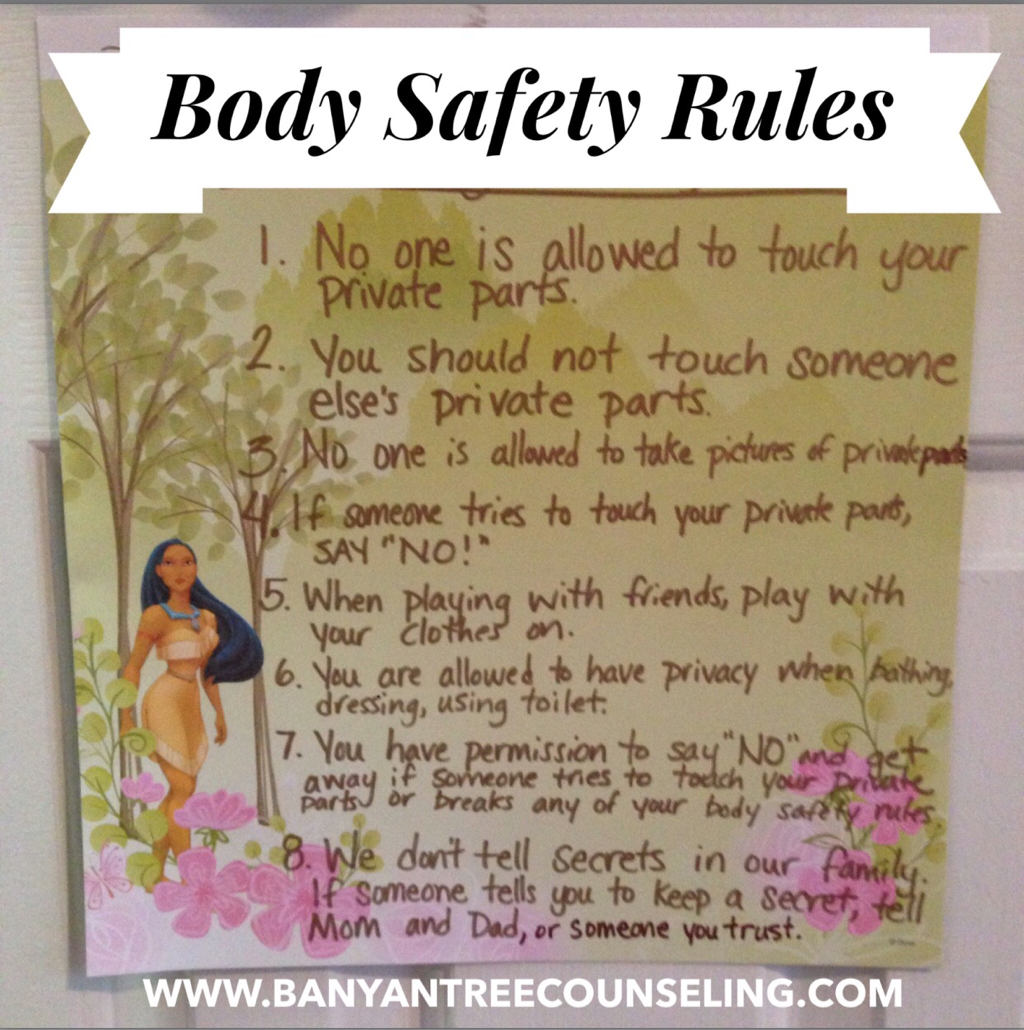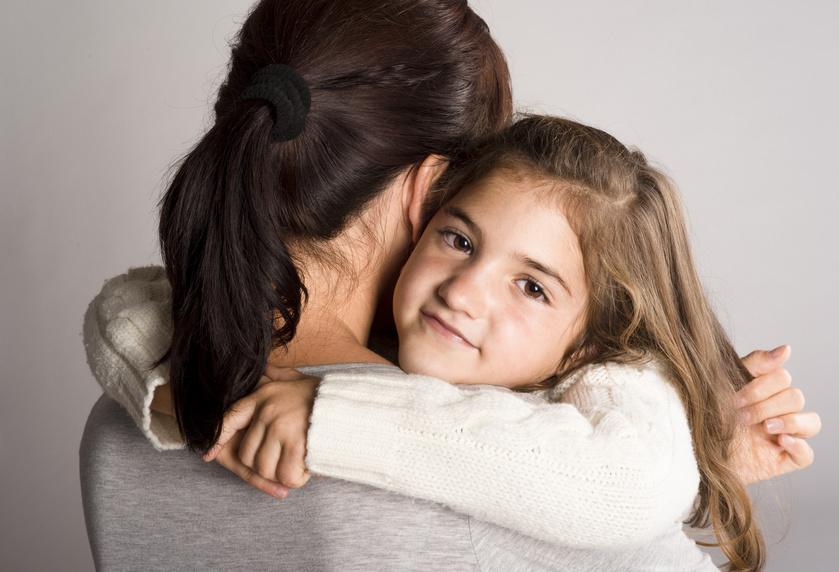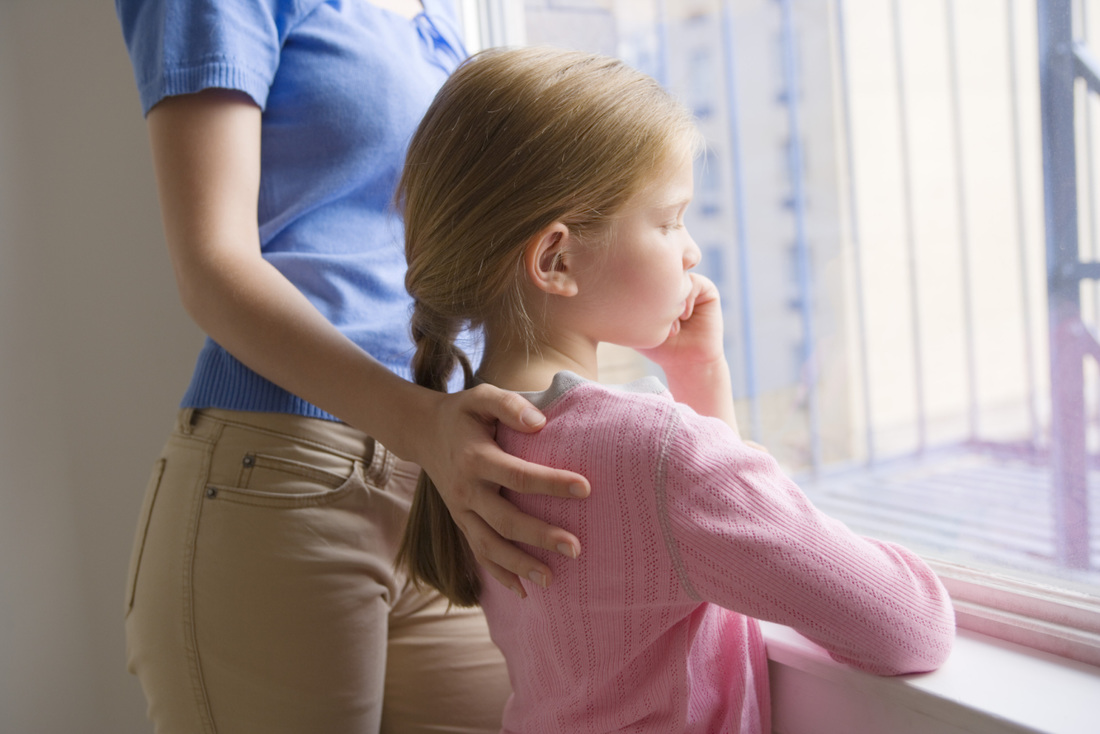- Home
-
Services
- Autism Assessments >
- Coaching
- Couples >
- Discernment Counseling
- Educational Consulting | Special Needs Advocacy >
- Psychiatric Services | Medication Management
- Nutrition
- Parenting + Family Therapy
- Play Therapy for Children
- Separation Counseling + Collaborative Parenting
- Telehealth
- Therapy for Teachers
- Trauma
- Schedule Appointment
-
Meet the Team
- Abby Olmstead
- Adrienne Fisher
- Amber Garcia >
- Amber Miner
- Andrea Miles
- Arionna Wilkerson
- Autumn Martin
- Amber Miner
- Brittany Kai
- Brittany Proxmire
- Brittany Stewart
- Bru Ramirez >
- Chantal D. Hayes
- Christine Ridley
- Emily Ortiz Badalamente
- Hayley McCraw
- Jamie Cullen
- Jared Brinkerhoff
- Jordan Peterson
- Josh Bolle
- Les Gura
- Lisa Carpenter
- Logan King
- Rashaad Nelson
- Sarah Vanderpool
- Savannah Ornt
- Simone Banks
- Tiffany Woods
- Administrative Staff >
- About Us
- Hiring
If your body parts could talk, what would they say?I've used this worksheet with my own children, with students I've taught, and with clients, both children and adults. Teaching kids to "tune in" to their bodies is an essential skill and doesn't always come naturally. There are so many benefits to learning this skill! One is emotional regulation-- kids who can listen to their body have an easier time managing and coping with their feelings, especially the really big ones, like anger, disappointment, fear, frustration, guilt, sadness.. . They feel more capable, confident, have a more secure sense of self. They have less behavioral problems, better social skills with peers, more empathy and supportive relationships... It's not just a skill for kids., Adults benefit in similar ways, too, with overall mental stability, positive sense of self, solid relationships, increased career satisfaction. Take a moment today to tune inward,. Breathe in for 4 seconds, hold for 7, and slowly release for 8. Then scan your body and really listen to what each body part is telling you. Maybe some are silent, while others are screaming! That's ok, no judgement. All you have to do is listen. Click to download the PDF to use at home.
1 Comment
The effects of sleep on a child's mental health can sometimes be underrated. Getting an adequate amount of sleep is an integral part of a healthy life, especially when it comes to our emotional and behavioral health. Now that the new school year is upon us, check out these handy charts to help set your child's bedtime! Please take a moment to read these five main points regarding the theory of child-centered play and what to expect before your child begins.1. It's Not Just Play-TimeYour child may report that he or she just played and did artwork. This does NOT mean that the therapy session was simply “play-time.” While play therapy is fun for the child involved, it also involves “work.” However, the work isn’t like schoolwork. They use the toys to process and work through whatever it is they are struggling with utilizing symbolism, metaphors and analogies to express themselves accurately. A child might use an egg to represent feeling breakable, dragons may represent their anger (or an annoying sibling), and fences or barriers may be a child’s way of feeling trapped or contained. Toys give children the freedom to express themselves in a way that makes sense to them when words just don’t seem to fit right. Play Therapy uses this form of expression to facilitate such things as healing, growth, and development. 2. It's Not a Quick-FixTherapy with children does not work overnight. One of the most important aspects of play therapy is the relationship between the child and therapist. Like any therapeutic relationship, trust, safety and security are vital. According to Maslow’s Hierarchy of Needs, a sense of safety and security is second only to food and shelter. Therefore, when children enter the play therapy room, they won’t find a counselor sitting in a grown up chair looking down at them asking questions, like most other adults they know. Instead, they will see their counselor on the floor with toys and objects that speak their language. Rather than being told what to do and given a lot of rules to follow, they will be given the freedom to explore and decide how they want to spend their time. The first few play sessions with a child center around building trust and safety rather than jumping straight to the problem at hand. Once the rapport is built however, a child feels safe enough to begin diving into what has brought him/her to therapy. Then the next phase of therapy begins. 3. Let Your Child LeadPlease do not ask your child what he did during a play therapy session. He will offer the information he wants you to know. Most of the therapeutic process is subconscious, and it may confuse your child by asking probing questions. The purpose of play therapy, especially with younger children, is not to expect the child to verbalize the therapeutic process, but instead for you to see decreased symptoms and improved functioning in significant areas of his or her life over time. 4. Refrain From Giving UpdatesYour therapist will come to meet you and your child in the waiting room, then take the child into the therapy room. Please do not update your therapist about your child in the waiting room with your child present. It is important that your child feel like the therapy time is his or hers. However, it is appropriate for you to leave me a confidential voicemail, send an email, or hand me a brief note at the beginning of session describing concerns, improvements, etc. If you begin to tell me an update, I will kindly remind you that the therapy time is for your child and that we can schedule a time to meet individually. Depending on the case, I usually meet with parents individually and/or with the child around every 4th session or so. Please let me know if something has come up and we can schedule a session before that. 5. Trust the Power of PlayChildren often come into play therapy defeated, confused, overwhelmed, and feeling as though their world is out of control. However, once a child enters play therapy and realizes that it is a world they can understand and communicate in, they often visibly relax. Allowing children this freedom to explore what is bothering them is healing in and of itself. Children heal from a nasty divorce, learn to calm themselves before they explode into a temper tantrum, and develop a high level of confidence to overcome struggles with anxiety, depression, or bullying. They move from self-loathing to self-acceptance and high self-esteem. That is the power of play. Empathy is defined as the ability to understand and share the feelings of another. It seems so simple, yet it is an essential (and often overlooked) skill children need to learn in order to develop into healthy adults. As parents, it’s not always in the forefront of our minds, and some may find it a bit odd to think they need to actually teach their child empathy. Doesn’t it just come naturally?Yes and no. Children are born with the aptitude for empathy, but it needs to be taught and encouraged throughout their childhood. Research shows there is a clear correlation between the ability to empathize and future fulfillment and success. Making (and keeping) worthy friends, succeeding in school, attaining a gratifying career, maintaining a healthy marriage, all of these things rely on one critical skill: EMPATHY.
|
|||||||||
| Why Play? In recent years a growing number of noted mental health professionals have observed that play is as important to human happiness and well being as love and work (Schaefer, 1993). Some of the greatest thinkers of all time, including Aristotle and Plato, have reflected on why play is so fundamental in our lives. |
The following are some of the many benefits of play that have been described by play theorists. It expands self-expression, self-knowledge, self-actualization and self-efficacy. Play relieves feelings of stress and boredom, connects us to people in a positive way, stimulates creative thinking and exploration, regulates our emotions, and boosts our ego (Landreth, 2002). In addition, play allows us to practice skills and roles needed for survival. Learning and development are best fostered through play (Russ, 2004).
What Exactly is Play Therapy?
Play therapy is a structured, theoretically based approach to therapy that builds on the normal communicative and learning processes of children (Carmichael, 2006; Landreth, 2002; O'Connor & Schaefer, 1983). The curative powers inherent in play are used in many ways. Therapists strategically utilize play therapy to help children express what is troubling them when they do not have the verbal language to express their thoughts and feelings (Gil, 1991).
In play therapy, toys are like the child's words and play is the child's language (Landreth, 2002). Through play, therapists may help children learn more adaptive behaviors when there are emotional or social skills deficits (Pedro-Carroll & Reddy, 2005). The positive relationship that develops between therapist and child during play therapy sessions provides a corrective emotional experience necessary for healing (Moustakas, 1997). Play therapy may also be used to promote cognitive development and provide insight about and resolution of inner conflicts or dysfunctional thinking in the child (O'Connor & Schaefer, 1983; Reddy, Files-Hall & Schaefer, 2005).
What Exactly is Play Therapy?
Play therapy is a structured, theoretically based approach to therapy that builds on the normal communicative and learning processes of children (Carmichael, 2006; Landreth, 2002; O'Connor & Schaefer, 1983). The curative powers inherent in play are used in many ways. Therapists strategically utilize play therapy to help children express what is troubling them when they do not have the verbal language to express their thoughts and feelings (Gil, 1991).
In play therapy, toys are like the child's words and play is the child's language (Landreth, 2002). Through play, therapists may help children learn more adaptive behaviors when there are emotional or social skills deficits (Pedro-Carroll & Reddy, 2005). The positive relationship that develops between therapist and child during play therapy sessions provides a corrective emotional experience necessary for healing (Moustakas, 1997). Play therapy may also be used to promote cognitive development and provide insight about and resolution of inner conflicts or dysfunctional thinking in the child (O'Connor & Schaefer, 1983; Reddy, Files-Hall & Schaefer, 2005).
Toys Are A Child's Words
Play therapy differs from regular play in that the therapist helps children to address and resolve their own problems. Play therapy builds on the natural way that children learn about themselves and their relationships in the world around them (Axline, 1947; Carmichael, 2006; Landreth, 2002). Through play therapy, children learn to communicate with others, express feelings, modify behavior, develop problem-solving skills, and learn a variety of ways of relating to others. Play provides a safe psychological distance from their problems and allows expression of thoughts and feelings appropriate to their development. APT defines play therapy as "the systematic use of a theoretical model to establish an interpersonal process wherein trained play therapists use the therapeutic powers of play to help clients prevent or resolve psychosocial difficulties and achieve optimal growth and development."
How Does Play Therapy Work?
Children are referred for play therapy to resolve their problems (Carmichael; 2006; Schaefer, 1993). Often, children have used up their own problem solving tools, and they misbehave, may act out at home, with friends, and at school (Landreth, 2002). Play therapy allows trained mental health practitioners who specialize in play therapy, to assess and understand children's play. Further, play therapy is utilized to help children cope with difficult emotions and find solutions to problems (Moustakas, 1997; Reddy, Files-Hall & Schaefer, 2005).
By confronting problems in the clinical Play Therapy setting, children find healthier solutions. Play therapy allows children to change the way they think about, feel toward, and resolve their concerns (Kaugars& Russ, 2001).Even the most troubling problems can be confronted in play therapy and lasting resolutions can be discovered, rehearsed, mastered and adapted into lifelong strategies (Russ, 2004).
Who Benefits from Play Therapy?
Although everyone benefits, play therapy is especially appropriate for children ages 3 through 12 years old (Carmichael, 2006; Gil, 1991; Landreth; 2002; Schaefer, 1993). Teenagers and adults have also benefited from play techniques and recreational processes.To that end, use of play therapy with adults within mental health,agency and other healthcare contexts is increasing (Pedro-Carroll & Reddy, 2005; Schaefer, 2003). In recent years, play therapy interventions have also been applied to infants and toddlers.
Play therapy differs from regular play in that the therapist helps children to address and resolve their own problems. Play therapy builds on the natural way that children learn about themselves and their relationships in the world around them (Axline, 1947; Carmichael, 2006; Landreth, 2002). Through play therapy, children learn to communicate with others, express feelings, modify behavior, develop problem-solving skills, and learn a variety of ways of relating to others. Play provides a safe psychological distance from their problems and allows expression of thoughts and feelings appropriate to their development. APT defines play therapy as "the systematic use of a theoretical model to establish an interpersonal process wherein trained play therapists use the therapeutic powers of play to help clients prevent or resolve psychosocial difficulties and achieve optimal growth and development."
How Does Play Therapy Work?
Children are referred for play therapy to resolve their problems (Carmichael; 2006; Schaefer, 1993). Often, children have used up their own problem solving tools, and they misbehave, may act out at home, with friends, and at school (Landreth, 2002). Play therapy allows trained mental health practitioners who specialize in play therapy, to assess and understand children's play. Further, play therapy is utilized to help children cope with difficult emotions and find solutions to problems (Moustakas, 1997; Reddy, Files-Hall & Schaefer, 2005).
By confronting problems in the clinical Play Therapy setting, children find healthier solutions. Play therapy allows children to change the way they think about, feel toward, and resolve their concerns (Kaugars& Russ, 2001).Even the most troubling problems can be confronted in play therapy and lasting resolutions can be discovered, rehearsed, mastered and adapted into lifelong strategies (Russ, 2004).
Who Benefits from Play Therapy?
Although everyone benefits, play therapy is especially appropriate for children ages 3 through 12 years old (Carmichael, 2006; Gil, 1991; Landreth; 2002; Schaefer, 1993). Teenagers and adults have also benefited from play techniques and recreational processes.To that end, use of play therapy with adults within mental health,agency and other healthcare contexts is increasing (Pedro-Carroll & Reddy, 2005; Schaefer, 2003). In recent years, play therapy interventions have also been applied to infants and toddlers.
How Will Play Therapy Benefit A Child?
Play therapy is implemented as a treatment of choice in mental health, school, agency, developmental, hospital, residential, and recreational settings, with clients of all ages (Carmichael, 2006; Reddy, Files-Hall & Schaefer, 2005).Play therapy treatment plans have been utilized as the primary intervention or as an adjunctive therapy for multiple mental health conditions and concerns (Gil &Drewes, 2004; Landreth, Sweeney, Ray, Homeyer& Glover, 2005), e.g anger management, grief and loss, divorce and family dissolution, and crisis and trauma, and for modification of behavioral disorders (Landreth, 2002), e.g. anxiety, depression, attention deficit hyperactivity (ADHD), autism or pervasive developmental, academic and social developmental, physical and learning disabilities, and conduct disorders (Bratton, Ray & Rhine, 2005).
Research supports the effectiveness of play therapy with children experiencing a wide variety of social, emotional, behavioral, and learning problems, including: children whose problems are related to life stressors, such as divorce, death, relocation, hospitalization, chronic illness, assimilate stressful experiences, physical and sexual abuse, domestic violence, and natural disasters (Reddy, Files-Hall & Schaefer, 2005). Play therapy helps children:
How Long Does Play Therapy Take?
Each play therapy session varies in length but usually last about 30 to 50 minutes. Sessions are usually held weekly. Research suggests that it takes an average of 20 play therapy sessions to resolve the problems of the typical child referred for treatment. Of course, some children may improve much faster while more serious or ongoing problems may take longer to resolve (Landreth, 2002; Carmichael, 2006).
Play therapy is implemented as a treatment of choice in mental health, school, agency, developmental, hospital, residential, and recreational settings, with clients of all ages (Carmichael, 2006; Reddy, Files-Hall & Schaefer, 2005).Play therapy treatment plans have been utilized as the primary intervention or as an adjunctive therapy for multiple mental health conditions and concerns (Gil &Drewes, 2004; Landreth, Sweeney, Ray, Homeyer& Glover, 2005), e.g anger management, grief and loss, divorce and family dissolution, and crisis and trauma, and for modification of behavioral disorders (Landreth, 2002), e.g. anxiety, depression, attention deficit hyperactivity (ADHD), autism or pervasive developmental, academic and social developmental, physical and learning disabilities, and conduct disorders (Bratton, Ray & Rhine, 2005).
Research supports the effectiveness of play therapy with children experiencing a wide variety of social, emotional, behavioral, and learning problems, including: children whose problems are related to life stressors, such as divorce, death, relocation, hospitalization, chronic illness, assimilate stressful experiences, physical and sexual abuse, domestic violence, and natural disasters (Reddy, Files-Hall & Schaefer, 2005). Play therapy helps children:
- Become more responsible for behaviors and develop more successful strategies.
- Develop new and creative solutions to problems.
- Develop respect and acceptance of self and others.
- Learn to experience and express emotion.
- Cultivate empathy and respect for thoughts and feelings of others.
- Learn new social skills and relational skills with family.
- Develop self-efficacy and thus a better assuredness about their abilities.
How Long Does Play Therapy Take?
Each play therapy session varies in length but usually last about 30 to 50 minutes. Sessions are usually held weekly. Research suggests that it takes an average of 20 play therapy sessions to resolve the problems of the typical child referred for treatment. Of course, some children may improve much faster while more serious or ongoing problems may take longer to resolve (Landreth, 2002; Carmichael, 2006).
How May My Family Be Involved in Play Therapy?
Families play an important role in children's healing processes. The interaction between children's problems and their families is always complex. Sometimes children develop problems as a way of signaling that there is something wrong in the family. Other times the entire family becomes distressed because the child's problems are so disruptive. In all cases, children and families heal faster when they work together. The play therapist will make some decisions about how and when to involve some or all members of the family in the play therapy.
At a minimum, the therapist will want to communicate regularly with the child's caretakers to develop a plan for resolving problems as they are identified and to monitor the progress of the treatment. Other options might include involving a) the parents or caretakers directly in the treatment in what is called filial play therapy and b) the whole family in family play therapy (Guerney, 2000). Whatever the level the family members choose to be involved, they are an essential part of the child's healing (Carey & Schaefer, 1994; Gil &Drewes, 2004).
Who Practices Play Therapy?
The practice of play therapy requires extensive specialized education, training, and experience. A play therapist is a licensed (or certified) mental health professional who has earned a Master's or Doctorate degree in a mental health field with considerable general clinical experience and supervision. With advanced, specialized training, experience, and supervision, mental health professionals may also earn the Registered Play Therapist (RPT) or Registered Play Therapist-Supervisor (RPT-S) credentials¹ conferred by the Association for Play Therapy (APT).
To learn more about Play Therapy, visit http://www.a4pt.org/
Families play an important role in children's healing processes. The interaction between children's problems and their families is always complex. Sometimes children develop problems as a way of signaling that there is something wrong in the family. Other times the entire family becomes distressed because the child's problems are so disruptive. In all cases, children and families heal faster when they work together. The play therapist will make some decisions about how and when to involve some or all members of the family in the play therapy.
At a minimum, the therapist will want to communicate regularly with the child's caretakers to develop a plan for resolving problems as they are identified and to monitor the progress of the treatment. Other options might include involving a) the parents or caretakers directly in the treatment in what is called filial play therapy and b) the whole family in family play therapy (Guerney, 2000). Whatever the level the family members choose to be involved, they are an essential part of the child's healing (Carey & Schaefer, 1994; Gil &Drewes, 2004).
Who Practices Play Therapy?
The practice of play therapy requires extensive specialized education, training, and experience. A play therapist is a licensed (or certified) mental health professional who has earned a Master's or Doctorate degree in a mental health field with considerable general clinical experience and supervision. With advanced, specialized training, experience, and supervision, mental health professionals may also earn the Registered Play Therapist (RPT) or Registered Play Therapist-Supervisor (RPT-S) credentials¹ conferred by the Association for Play Therapy (APT).
To learn more about Play Therapy, visit http://www.a4pt.org/
Authors
The information displayed for the general public and mental health professionals in this section was initially crafted by JP Lilly, LCSW, RPT-S, Kevin O'Connor, PhD, RPT-S, and Teri Krull, LCSW, RPT-S and later revised in part by Charles Schaefer, PhD, RPT-S, Garry Landreth, EdD, LPC, RPT-S, and Dale-Elizabeth Pehrsson, EdD, LPC, RPT-S. Linked mental health conditions and concerns and behavioral disorders were drafted by Pehrsson and Karla Carmichael, PhD, LPC, RPT-S respectively. Research citations were compiled by Pehrsson and Oregon State University graduate assistant Mary Aguilera. APT sincerely thanks these individuals for their contributions!
The information displayed for the general public and mental health professionals in this section was initially crafted by JP Lilly, LCSW, RPT-S, Kevin O'Connor, PhD, RPT-S, and Teri Krull, LCSW, RPT-S and later revised in part by Charles Schaefer, PhD, RPT-S, Garry Landreth, EdD, LPC, RPT-S, and Dale-Elizabeth Pehrsson, EdD, LPC, RPT-S. Linked mental health conditions and concerns and behavioral disorders were drafted by Pehrsson and Karla Carmichael, PhD, LPC, RPT-S respectively. Research citations were compiled by Pehrsson and Oregon State University graduate assistant Mary Aguilera. APT sincerely thanks these individuals for their contributions!
Banyan Tree Counseling & Wellness
We are a team of licensed clinicians with a holistic, strengths-based, and evidence-based approach. We offer counseling for people of all ages, life coaching, group therapy, educational consulting and advocacy, assessments, and dietary nutrition services.
Categories
All
Active Listening
Adolescents
Anxiety
Children
Conflict
COVID-19
Depression
Effective Communication
Emotional Regulation
Empathy
Family
For Clinicians
Holidays
Life Coaching
Medication
Mindfulness
Office Photos
Parenting
Play Therapy
Poetry
Psychoeducation
Sleep
Trauma
Individual Counseling • Psychiatric Services • Medication Management • Nutrition counseling
COUPLES & FAMILIES • CHILDREN & TEENS • EDUCATIONAL ADVOCACY
If you are in a life threatening situation call 1 (800) 273-8255 or use these resources to get immediate help.
HIPAA Notice of Privacy Practices
© 2015-2024 Banyan Tree Counseling PLLC | Banyan Integrated Health PLLC | Banyan Tree Wellness LLC | All Rights Reserved.
All content on this website, unless otherwise specified, is the sole property of Banyan Tree Counseling & Wellness and is protected by copyright laws.
Any unauthorized reproduction, distribution, or use of this content is strictly prohibited and may result in legal action.
HIPAA Notice of Privacy Practices
© 2015-2024 Banyan Tree Counseling PLLC | Banyan Integrated Health PLLC | Banyan Tree Wellness LLC | All Rights Reserved.
All content on this website, unless otherwise specified, is the sole property of Banyan Tree Counseling & Wellness and is protected by copyright laws.
Any unauthorized reproduction, distribution, or use of this content is strictly prohibited and may result in legal action.
- Home
-
Services
- Autism Assessments >
- Coaching
- Couples >
- Discernment Counseling
- Educational Consulting | Special Needs Advocacy >
- Psychiatric Services | Medication Management
- Nutrition
- Parenting + Family Therapy
- Play Therapy for Children
- Separation Counseling + Collaborative Parenting
- Telehealth
- Therapy for Teachers
- Trauma
- Schedule Appointment
-
Meet the Team
- Abby Olmstead
- Adrienne Fisher
- Amber Garcia >
- Amber Miner
- Andrea Miles
- Arionna Wilkerson
- Autumn Martin
- Amber Miner
- Brittany Kai
- Brittany Proxmire
- Brittany Stewart
- Bru Ramirez >
- Chantal D. Hayes
- Christine Ridley
- Emily Ortiz Badalamente
- Hayley McCraw
- Jamie Cullen
- Jared Brinkerhoff
- Jordan Peterson
- Josh Bolle
- Les Gura
- Lisa Carpenter
- Logan King
- Rashaad Nelson
- Sarah Vanderpool
- Savannah Ornt
- Simone Banks
- Tiffany Woods
- Administrative Staff >
- About Us
- Hiring

